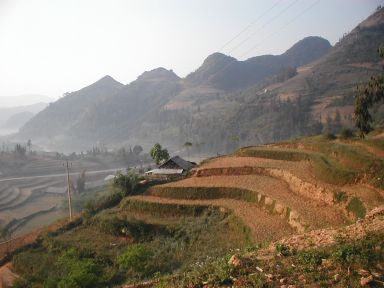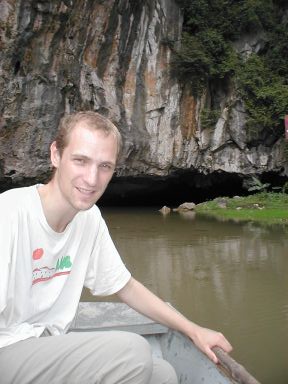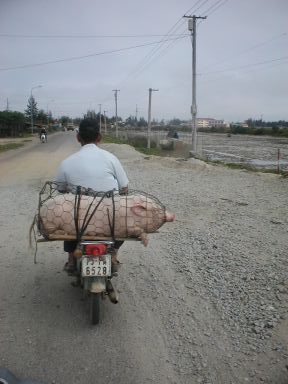The train journey along the Red River from Vietnam into 云南 province (Yunnan, Cloud South) is stunning. I embarked at 河口 (Hekou, River Entrance) , the border town, armed with only half a bottle of water and no food. The Playboy kindly met me in the morning, albeit half an hour late. I’d given up and gone to the station on my own, but he found me half way there. To get in with the spirit of things I checked to see if he’d been with a girl, but he denied it. He helped me buy a ticket and get on the train. Immediately the station was impressive, clean, organised, with neatly tended plants. A security guard searched my luggage before boarding. The Playboy wrote a note in Chinese to help me later on with the second leg of the journey, but I put it away thinking that with my phrasebook I wouldn’t really need it.
Fat guards with well made uniforms whistled for the train to leave. As we pulled out into the countryside, everywhere outside felt vast and cold and misty. Pucker signalmen stood precisely on their designated spots by the track. The soft dawn light hurtled past. Inside it was brightly lit and clean. I managed to buy some pine nuts and extra water from one of the stour staff, and then a bit later on some excellent thick noodles in a spicy sauce. Everything so disciplined. It feels like an empire.
I had no idea how long the train journey was going to take, but after a few hours it becamse clear that it would be all day rather than just the morning. As a policy I don’t look at my watch on public transport, or even ask how long it is going to take. A policy that was essential in unreliable Ghana or Myanmar, and psychologically makes journeys anywhere much more enjoyable.
The Chinese were very friendly on the train, so if anyone ever said anything to you about them being unfriendly people, forget about it. A few different groups of people and individuals sat near me. For most of the journey, The Journalist (as I shall call him) was opposite. He gave me a great Chinese bun thing with a tasty meat paste in the middle, and some pineapple. When I got out my Chinese characters (for the last couple of weeks I’ve been learning some, and am up to maybe 50) he helped show me how to really draw them.
The train tracked the Red River into China. There were incredible terraces in the river valley, growing all kinds of crops. Exciting to see wheat, and cabbages, and all sorts of others, grown in a patchwork, after the monotonous rice-everywhere of Vietnam. Beautiful irrigation systems with photogenic dams redirecting the small river into channels, sometimes lifting it half way up the side of the deep valley and sometimes letting it flow the natural course.
In the mountains the train weaved in and out of tunnels. Suddenly, I looked out the window and glimpsed below us a vast gorge, so steep as to nearly be a waterfall. Everything lush and green and wet. Out the window the other side we sometimes hugged the edge of the hills, giving an epic but not so good view down across the wide, cloudy plain to the west. A mountain on our right so large I can’t quite believe it and have to keep looking back at it. Back into the tunnels, then without warning hills around, speckled all over with small white boulders.
Suffice is to say, this is a recommended train journey. And I haven’t even mentioned the numerous small stations, with confident, well looking mountain people, getting on and getting off. Workmen with flasks of green tea, refilled by a guard with a kettle. Huge earthworks of unknown purpose, perhaps new dams. Down on the plain, massive agricultural areas – there were some crops protected by a sort of cloth greenhouse that went on forever.
The train pulled into its final stop 开远 (Kaiyuan, Open Distant) in the early evening. Attempts at communication between The Journalist and I had been less than successful. They consisted of either him talking in Chinese, and me not understanding, or him writing a simple sentence in Chinese, and me not understanding. The sentences were a bit better as sometimes I understood a couple of characters, and I could recognise place names and times. My phrasebook was less than helpful at everyday conversation. Anyway, somehow he made it clear that when we got to Kaiyuan he would come with me, I thought perhaps he would show me a good hotel, or we would have dinner together.
He walked me to the bus station. Two American travellers in Hanoi had said that the train from the border to 昆明 (Kunming, Multitudes Bright) wasn’t running at all; I assumed that was a half truth, and it only runs to Kaiyuan, hence the need now for a bus. Anyway, by this point I was thinking I might not go straight to Kunming and instead try and get a bus westwards, and explore a bit more of this area. None of this stuff is in my China Lonely Planet; it briefly mentions the existence of Hekou, but otherwises mentions no places in the intervening area. This is why I kept having to wing it. Doing things that are Not In The Book, is obviously Dangerous and only to be attempted by Very Brave Travellers. Obviously this is much more fun.
With infinite patience The Journalist made it through another rupture in communications with me, and managed to explain that the next bus to Kunming was at 10pm that night. Since I wasn’t sure that I wanted to go to Kunming at this point, and I was tired after the unexpectedly long train journey, I instead managed to convey that I would spend the night in a hotel. I failed to convey that I would then decide what I wanted to do in the morning.
We went to the hotel next to the bus station, and from handy pictures I selected a cheap room (70 yuan, or about $9). There was some confusion at this point because I had to hand over 200 yuan, and I couldn’t work out why, but in the end I just went for it to see how events took their course (the next day it turned out to be a deposit which I got back). The Journalist insisted on coming up to the room with me, and I looked it over and said it was fine. Then he put his bag down, and he kept trying to communicate with me about buses, or days or something. I was trying to explain that I might stay a couple of days in Kaiyuan, as in the sun it had looked quite bright, clean and interesting, and I needed some time to rest and acclimatise to China.
He got increasingly confused, and in the end looked through my notebook, and found the note that The Playboy had written to expediate my onwards journey. Ah! Now I remember, he’d read it on the train! The Playboy had obviously written in no uncertain terms that I needed every assistance on my journey to Kunming (this isn’t true, it’s not that hard to buy bus tickets with the name of the destination in Chinese characters from your guidebook), and so The Journalist was kindly doing everything he could to help me out.
Then it dawned on me that he intended to stay the night in the same room. There were two problems with this:
- I didn’t want him to.
- He hadn’t paid.
By this point I’d collapsed on my bed, half groaning, half laughing. I wanted to ask all sorts of complex questions, like where would he be if I wasn’t there? Didn’t he have work to go to, or another train to catch? It was at this point that he did show me his card that amongst lots of Chinese said “Press Pass”, hence my name for him. Without being really rude and physically throwing him out the room, and then with the loss of a probably entertaining evening, I didn’t know what to do.
Chinese people when they help you are obviously very helpful, and very clingy. I’m sure to him it seemed quite the natural solution for him to stay in my room, most economical and convenient for us both. In the end I decided to let him stay, but to take reasonable precautions that when I use the bathroom my money belt and passport are with me, rather than in the room. My main fear was that this was an elaborate con, but it seemed unlikely, and anything would be better than my previous nights sleep…
 I only had one morning before having to go to the border, so I took the shortest walk up to a village called Bam Pho (I think) 5km from Bac Ha. The people were obviously used to seeing westerners, but not midweek, and were very friendly and kind. I ended up following two up past the village to some fields on the hills where they were going to work in the morning. Hill farmer commuting. They kept going up to the highest peak, but I didn’t have time to follow. They were Flower Hmong, and the women wore bright colourful clothing. Compared to villages that I saw in Myanmar, this one was very well organised. The houses seemed better built, and the village was kept cleaner, with better managed paths and roads. I’d be interested to find out whether this was because of Communist rural influence (near Kengtung in Myanmar where I saw other villages has been largely untouched by any government, if anything actively harmed), larger quantities of proximate tourism over a longer time, or simply a better organised / technologically advanced ethnic minority.
I only had one morning before having to go to the border, so I took the shortest walk up to a village called Bam Pho (I think) 5km from Bac Ha. The people were obviously used to seeing westerners, but not midweek, and were very friendly and kind. I ended up following two up past the village to some fields on the hills where they were going to work in the morning. Hill farmer commuting. They kept going up to the highest peak, but I didn’t have time to follow. They were Flower Hmong, and the women wore bright colourful clothing. Compared to villages that I saw in Myanmar, this one was very well organised. The houses seemed better built, and the village was kept cleaner, with better managed paths and roads. I’d be interested to find out whether this was because of Communist rural influence (near Kengtung in Myanmar where I saw other villages has been largely untouched by any government, if anything actively harmed), larger quantities of proximate tourism over a longer time, or simply a better organised / technologically advanced ethnic minority. Since then Gavin and I have mainly hung out in Hanoi, going to museums. We took a day trip to Tam Coc, which has the same limestone rock outcrops as Halong only on land. There’s a river for irrigation which has been made to flow between the outcrops, with paddy fields on every side. Being rowed along the river was also quite eerie, and just as impressive as Halong. Occasionally the river went through a cave underneath an outcrop, where the light shining in from each end produced a fantastic contrast of colours. (Picture is of me on the boat, with one of the caves behind).
Since then Gavin and I have mainly hung out in Hanoi, going to museums. We took a day trip to Tam Coc, which has the same limestone rock outcrops as Halong only on land. There’s a river for irrigation which has been made to flow between the outcrops, with paddy fields on every side. Being rowed along the river was also quite eerie, and just as impressive as Halong. Occasionally the river went through a cave underneath an outcrop, where the light shining in from each end produced a fantastic contrast of colours. (Picture is of me on the boat, with one of the caves behind). Travelling in a car in Hanoi is an eerie experience. Usually I’ve been getting round by Xe Om (literally “motorbike hug”), which is a scooter taxi that you sit on the back off. Almost all the vehicles on the streets are very low power motorbikes, buzzing about at 20mph. A Honda Dream is the dream purchase. Powered bike traffic has many advantages; it’s cheaper, many more vehicles fit on the street, it is environmentally friendly, it is point to point even going down narrow alleys. Of course it isn’t so good in the rain, or for old people, and it is dangerous. You’d be amazed by the luggage people can fit on a motorbike – I’ve seen entire chicken coops with chickens, a very large pig in a cage ready for slaughter, and Gavin even spotted someone transporting another bike on the back of a bike (OK, it was a pedal bike).
Travelling in a car in Hanoi is an eerie experience. Usually I’ve been getting round by Xe Om (literally “motorbike hug”), which is a scooter taxi that you sit on the back off. Almost all the vehicles on the streets are very low power motorbikes, buzzing about at 20mph. A Honda Dream is the dream purchase. Powered bike traffic has many advantages; it’s cheaper, many more vehicles fit on the street, it is environmentally friendly, it is point to point even going down narrow alleys. Of course it isn’t so good in the rain, or for old people, and it is dangerous. You’d be amazed by the luggage people can fit on a motorbike – I’ve seen entire chicken coops with chickens, a very large pig in a cage ready for slaughter, and Gavin even spotted someone transporting another bike on the back of a bike (OK, it was a pedal bike).